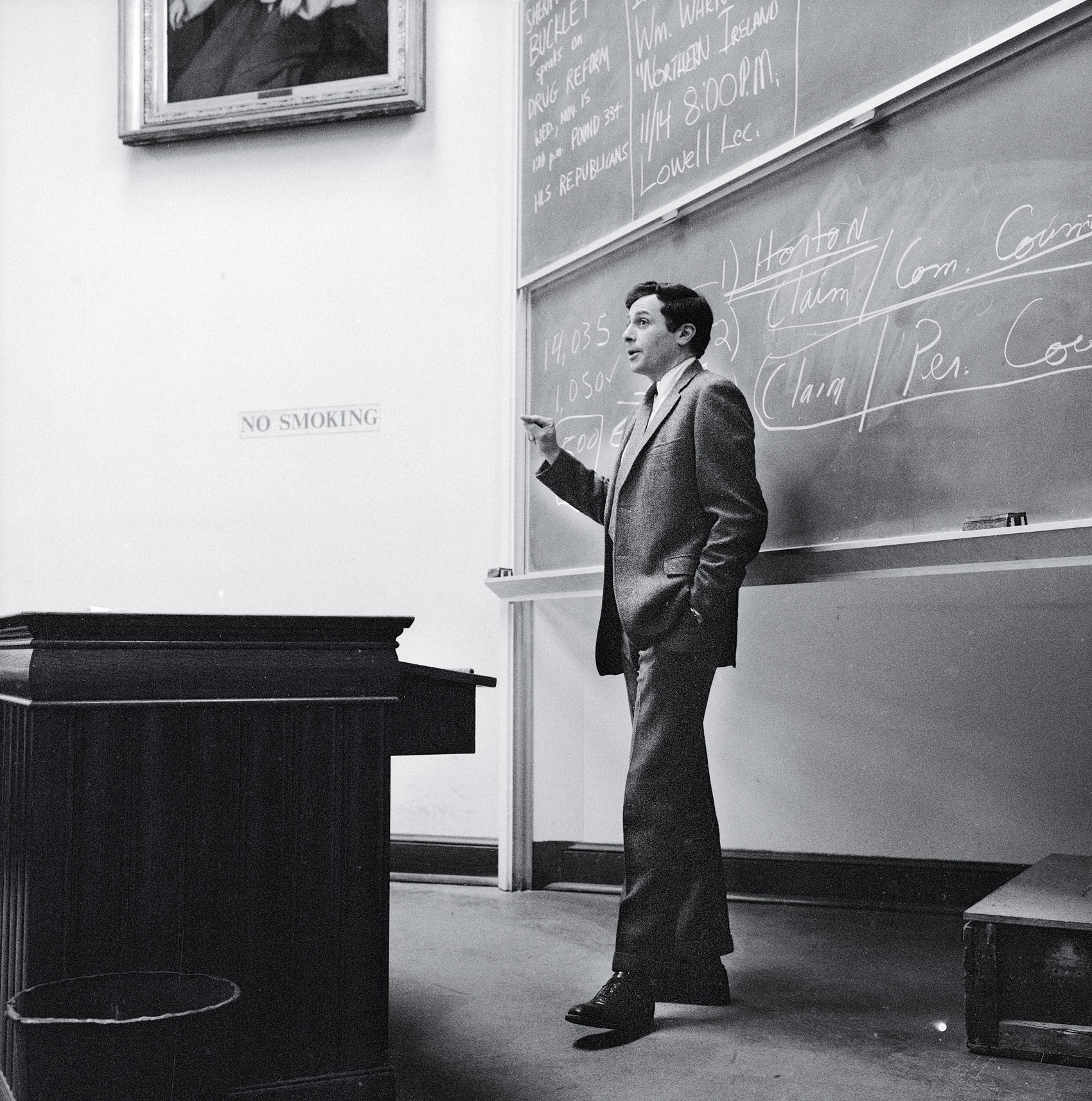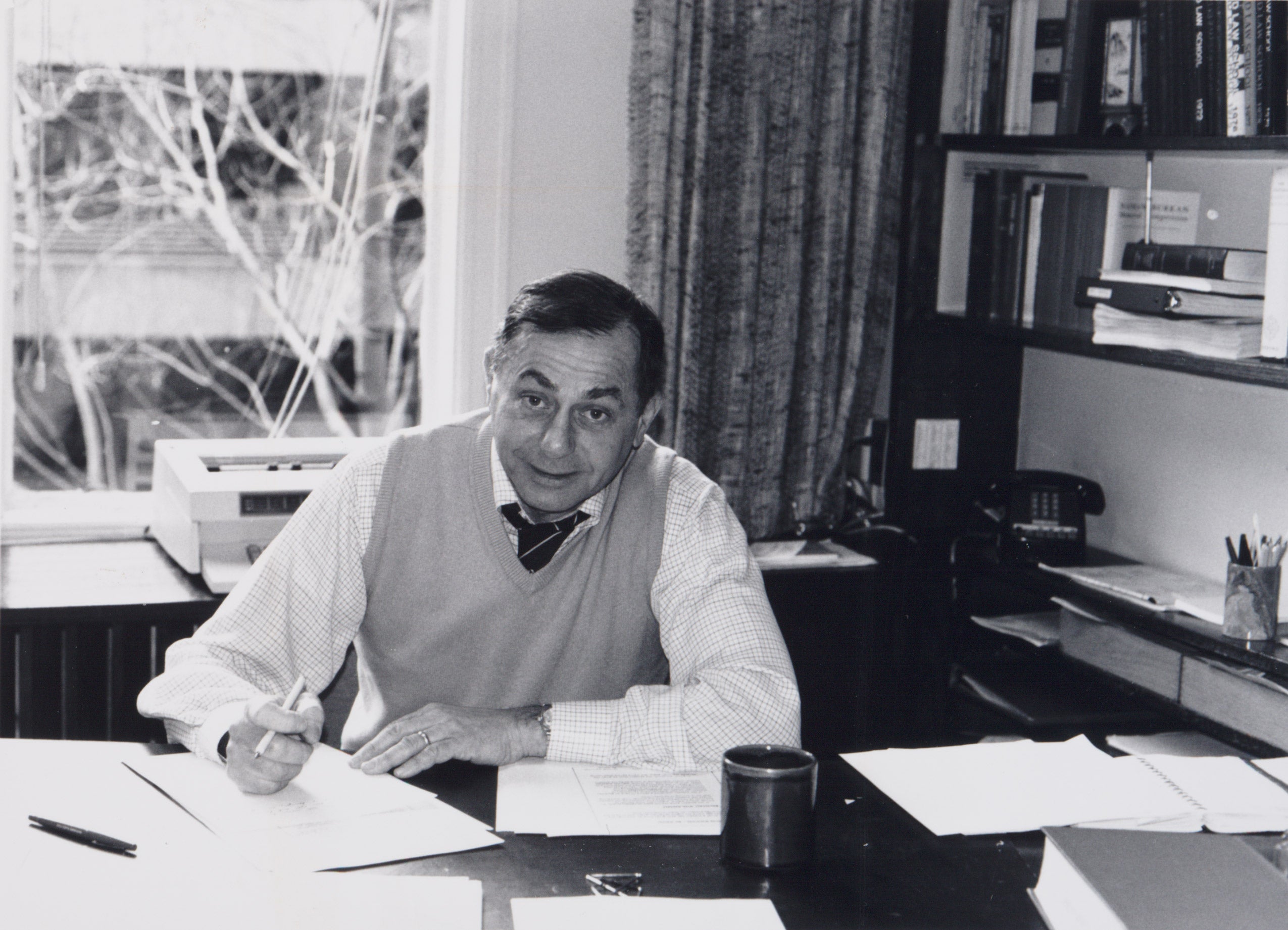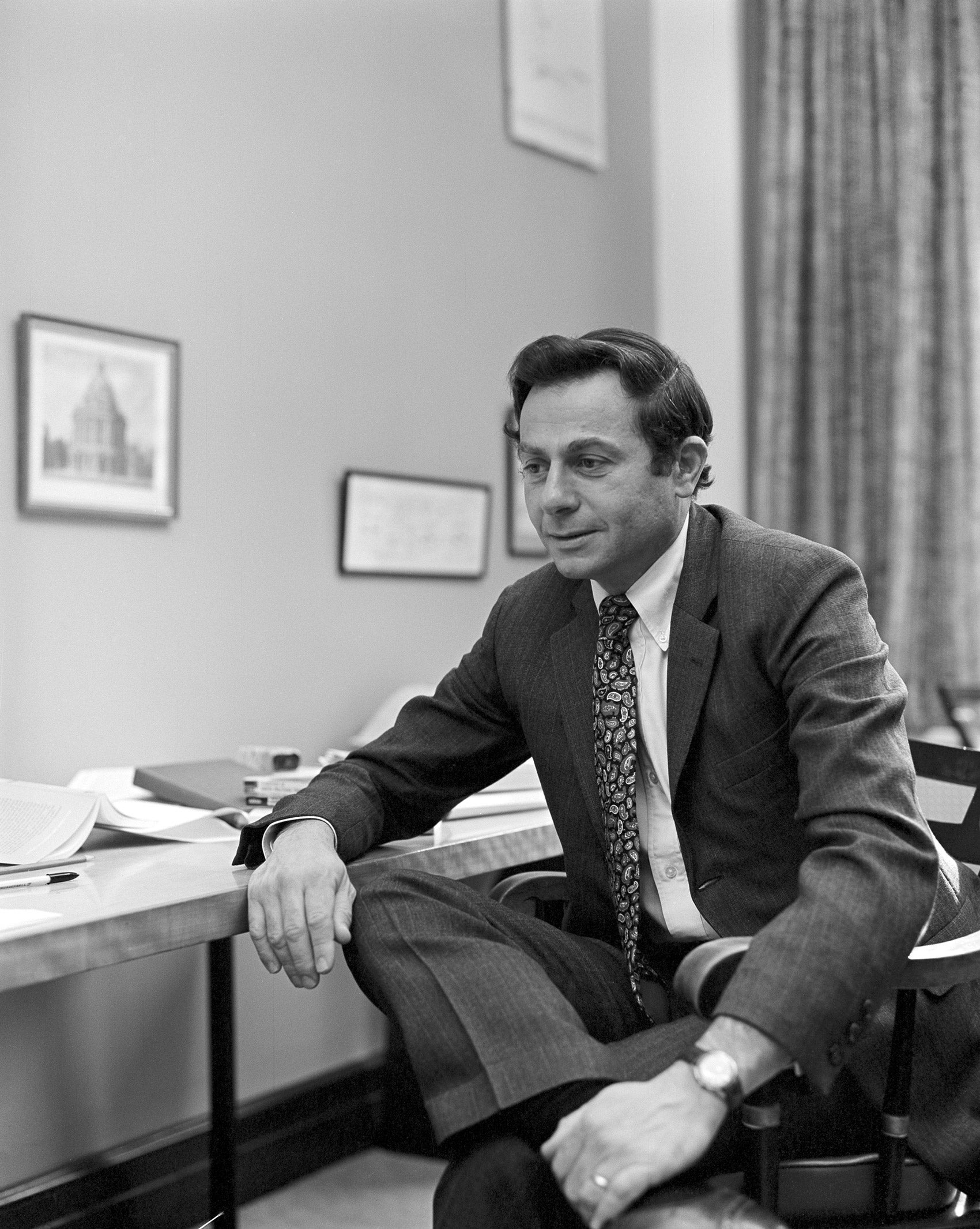Lloyd L. Weinreb ’62 is “one of the great figures in the history of our Law School,” said John F. Manning ’85, the Morgan and Helen Chu Dean and Professor of Law at Harvard Law School, in a message to the community in mid-December. During his half-century tenure at HLS, Weinreb was known nationwide as a leading authority on criminal and copyright law — and on campus as an HLS treasure, a professor whose classes were not to be missed.
A number of distinguished colleagues and friends paid tribute to Weinreb, who passed away on Dec. 15, at the age of 85.

“He was a thoughtful scholar, who deepened our understanding not only of the criminal justice system but also of the philosophical foundations of law,” Manning said. “And he was a great institutional citizen, taking on important and sometimes difficult tasks with care and integrity.” On a personal note, Manning recalled studying with Weinreb himself. “He was an amazing teacher. He loved the law and all its complexity. He also loved learning along with his students. He listened well and carefully and always made class a place for thinking collaboratively and respectfully about hard questions that mattered. It was an exhilarating experience.”
“Lloyd Weinreb was a prince,” said Elena Kagan ’86, associate justice of the Supreme Court and former dean of HLS. “As a student, I took his criminal justice class and found what countless others before and after me did: He was a simply superb teacher, for all the right reasons. He wanted students to think deeply about the hardest questions, and he made the classroom a place for doing just that. He was probing and thoughtful; somehow both profound and funny; demanding but encouraging too. When I began to teach, I thought of him often — mostly to wonder how he did it. And when I became dean of HLS, I learned to value him for still other qualities. I’m not sure he realized it, but he was the kind of person who holds an institution together. In so many matters, he was wise beyond measure, and a model of decency, civility, and grace. He demonstrated every day, by everything he did, how to participate in a community, and to help move it forward. He gave the best advice, with a light touch. And on top of everything else, he was sterling company. I’ll miss him very much.”
Cass Sunstein ’78, the Robert Walmsley University Professor at Harvard, said: “Lloyd Weinreb was the kindest person I have ever known, and the soul of generosity, and brilliant, and wise on matters large and small, and really, really funny (he was mischievous!), and loyal (and present!) through life’s worst travails, and delighted (and present!) through life’s celebrations, and unfailingly wise, and shockingly humble, and the best friend you could possibly have, or ever imagine. He also changed my life. He was my most beloved teacher in college, and my most important mentor for over 40 years, and my deeply beloved colleague for over a decade. For countless people, losing him is a complete and thorough devastation, not even to be believed; knowing him was one of life’s greatest blessings.”
Another notable former student, current White House Chief of Staff Ronald A. Klain ’87, said: “Lloyd Weinreb was an incredible teacher and scholar who shaped generations of minds at Harvard Law School — and well beyond — including myself. His teaching style was to ask the hard questions and demand that his students come up with their own answers, which he relentlessly poked holes in, until they were well-formulated and thoroughly considered. His writing was brilliant, insightful, creative, and challenging. Decades after being in his classroom, I still look back at his work frequently for wisdom and perspective. He will be terribly missed.”

“From the time when he first joined the Law faculty to the end of his life, Lloyd was a close and dear friend,” said Derek Bok ’54, former Harvard University president and dean of HLS from 1968 to 1971. “He was always engaging to be with because his interests ranged so widely from law to philosophy to theater and opera and books of every kind, as well as to his travels to every corner of the world. From all of these sources, he drew ideas and observations that were wise, insightful and thought-provoking. Such friendships are impossible to replace, so I will miss him dearly.”
Born in 1936, Weinreb received a B.A. from Dartmouth College in 1957, and a B.A. in philosophy, politics and economics from the University of Oxford in 1959, before earning his LL.B. from HLS in 1962. Early in his career, he clerked for U.S. Supreme Court Justice John Marshall Harlan II. He taught for several semesters at Fordham Law School. In 1969, he taught at the University of Los Andes, in Bogota, Col0mbia, and he spent several months in Paris, where he studied the French system of criminal justice.
Richard Fallon, the Story Professor of Law at HLS, was both a colleague and a longtime friend of Weinreb’s. “Lloyd was not only an outstanding teacher and scholar but also, and more importantly, an exemplary human being,” he said. “Within a year or two of my joining the faculty in 1982, he had become a mentor — the older brother that I never had — in virtually every aspect of my life. Lloyd was an inspiration to me in his meticulous attention to his students, his devotion to his family, his warm outreach to friends across many generations, and his breadth of interests. For the past 40 years, whenever I put down a book that I liked, I have invariably thought to myself that I must talk to Lloyd about it, because talking to him about books and ideas was always great, great fun. He was also stunningly generous with his time and wise advice. Having the opportunity to be Lloyd’s friend was one of the great gifts of my life.”

Early in his career, as an attorney in the Criminal Division of the Department of Justice, Weinreb was named to the Warren Commission, formed a week after the assassination of President John F. Kennedy to investigate the murder. Weinreb was charged with researching and writing the biography of Lee Harvey Oswald. During the 50th anniversary of the assassination, he was one of the authorities called in to debunk still-active conspiracy theories. “[People] don’t like the notion that random happenings determine many aspects of our lives,” he told Reuters in 2013. “But it was an immense set of fortuities that left Oswald in the path of the presidential route through Dallas. … I have no doubt whatsoever that it was Oswald and Oswald alone.”
Weinreb joined the HLS faculty in 1965, teaching courses on Criminal Law, Criminal Procedure, Intellectual Property, Political and Legal Philosophy, and Jurisprudence. In the 1990s, he began teaching Copyright, and he published a much-discussed article on the subject in the Harvard Law Review. A much admired HLS professor, he was named in a 2003 Harvard Law Record story as one of “Ten Professors to Take.” Describing him as a “no-frills kind of guy,” the article stated that “What students will find in Weinreb is a model of competence, a master of clarity, and someone who knows exactly where to put the spotlight on the issues. His mild-mannered approach also masks considerable dry wit that makes his classes enjoyable even in the earlier hours.”
Characteristically, he avoided fuss by initially keeping his 2014 decision to retire to himself. In an HLT tribute for that occasion, Fallon called attention to Weinreb’s rich intellectual life outside of the law. He spent most mornings studying classical Greek and was also a theater enthusiast, serving as president of the Abbey Theatre Foundation of America; he also wrote a few unpublished plays. “Although spectator sports hold no interest for Lloyd, it has sometimes seemed to me that nearly everything else does,” Fallon wrote.
His wide-ranging interests are reflected in his scholarship, including the magisterial “Natural Law and Justice” (1987), which traces the evolution of natural law tradition through ancient Greece, to the age of Thomas Aquinas to the present day. A more recent work of legal philosophy, “Oedipus at Fenway Park” (1994), examined the concept of rights through the ages, from Greek mythology to modern disputes over gay rights and handicapped access. Weinreb also loved children’s literature and recently wrote the children’s book “Erma Elephant and the Really Big Hole.”
In addition to his scholarly pursuits, Weinreb loved spending time with his family, chopping wood, building rock walls, hiking, and animals.
He is survived by Ruth Plaut Weinreb, his wife of 58 years and herself a retired professor, by his three children, Jenni Weinreb Owen, Lizzie Weinreb Fishman, and Daniel Weinreb, and by his Labrador retriever Luc.
